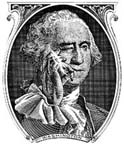12.21.2005
 Judge Resigns in Protest, Newspaper Says
Judge Resigns in Protest, Newspaper SaysDecember 21, 2005
(12-21) 04:18 PST WASHINGTON, (AP) --
A federal judge has resigned from a special court set up to oversee government surveillance to protest President Bush's secret authorization of a domestic spying program on people with suspected terrorist ties, The Washington Post reported.
The action by U.S. District Judge James Robertson stemmed from deep concern that the surveillance program that Bush authorized was legally questionable and may have tainted the work of the court that Robertson resigned from, the newspaper said in Wednesday's editions.
The Post quoted two associates of the judge.
Robertson was one of 11 members of the secret Foreign Intelligence Surveillance Court, which oversees government applications for secret surveillance or searches of foreigners and U.S. citizens suspected of terrorism or espionage.
Quoting colleagues of Robertson, the Post said the judge had indicated he was concerned that information gained from the warrantless surveillance under Bush's program subsequently could have been used to obtain warrants under the FISA program.
The Post said Robertson, without providing an explanation, stepped down from the FISA court in a letter late Monday to Chief Justice John Roberts. He did not resign his parallel position as a federal district judge.
Supreme Court spokeswoman Kathy Arberg said early Wednesday she had no information to offer on the matter.
Robertson was appointed a federal judge by President Clinton in 1994. Chief Justice William Rehnquist later appointed Robertson to the FISA court as well.
Robertson has been critical of the Bush administration's treatment of detainees at the U.S. naval prison at Guantanamo Bay, Cuba, most memorably in a decision that sidetracked the president's system of military tribunals to put some detainees on trial.
Robertson's resignation was reported hours after Vice President Dick Cheney strongly defended the surveillance program and called for "strong and robust" presidential powers.
Cheney — a former member of congress, defense secretary and White House chief of staff under President Ford — said executive authority has been eroding since the Watergate and Vietnam eras.
"I believe in a strong, robust executive authority and I think that the world we live in demands it," Cheney said.
"I would argue that the actions that we've taken there are totally appropriate and consistent with the constitutional authority of the president. ... You know, it's not an accident that we haven't been hit in four years," the vice president said, speaking with reporters Tuesday on Air Force Two en route from Pakistan to Oman.
Republicans said Congress must investigate whether Bush was within the law to allow the super-secret National Security Agency to eavesdrop — without warrants — on international calls and e-mails of Americans and others inside the United States with suspected ties to al-Qaida.
"I believe the Congress — as a coequal branch of government — must immediately and expeditiously review the use of this practice," said Sen. Olympia Snowe, R-Maine.
Snowe joined three other members of the Senate Intelligence Committee, including Nebraska Republican Chuck Hagel, in calling for a joint inquiry by the Senate judiciary and intelligence committees.
Bush and his top advisers have suggested senior congressional leaders vetted the program in more than a dozen highly classified briefings. Several Democrats agreed said they were told of the program, but did not know the full details and had concerns.
West Virginia Sen. Jay Rockefeller, the Senate Intelligence Committee's top Democrat, on Monday released a letter he wrote to Cheney in July 2003 that, given the program's secrecy, he was "unable to fully evaluate, much less endorse these activities."
Senate Intelligence Committee Chairman Pat Roberts, R-Kan., pushed back Tuesday, saying that if Rockefeller had concerns about the program, he could have used the tools he has to wield influence, such as requesting committee or legislative action. "Feigning helplessness is not one of those tools," Roberts said.
©2005 Associated Press
****************************************************************************
From URL: http://sfgate.com/cgi-bin/article.cgi?file=/n/a/2005/12/21/national/w041822S90.DTL
